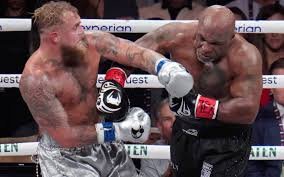Introduction: The Phenomenon of Mike Tyson
Mike Tyson, often referred to as “Iron Mike,” is one of the most iconic figures in boxing history. Known for his ferocious fighting style, incredible power, and complex personal life, Tyson’s journey from a troubled youth to a heavyweight champion is both inspiring and cautionary. This blog post delves into the life, achievements, and legacy of Mike Tyson, exploring the various facets that have defined his career and personal experiences.
Early Life: From Adversity to Aspiration
Humble Beginnings
Mike Tyson was born on June 30, 1966, in Brooklyn, New York, to a family struggling with poverty. Raised in a challenging environment, Tyson’s early life was marked by instability. His father abandoned the family when he was just two years old, leaving his mother, Lorna, to raise him and his siblings alone. Lorna struggled to provide for her children, often resorting to welfare.
Troubled Youth
Tyson’s childhood was turbulent. He was exposed to crime and violence at a young age, leading him to become involved in petty crime and street fights. By the age of 13, he had been arrested multiple times. However, it was during this tumultuous period that Tyson discovered boxing. He was introduced to the sport by Bobby Stewart, a former boxer who recognized Tyson’s potential and took him under his wing.
Mentorship and Training
Under Stewart’s guidance, Tyson honed his skills and developed an intense passion for boxing. He later became a student of the legendary trainer Cus D’Amato, who not only trained him but also became a father figure to him. D’Amato instilled discipline and focus in Tyson, shaping him into a formidable fighter. Tyson’s amateur career saw him winning the National Junior Olympics in 1981, setting the stage for his professional debut.
Professional Career: The Rise of a Champion
Debut and Early Success
Tyson made his professional boxing debut on March 6, 1985, at the age of 18, quickly making a name for himself with his explosive style and knockout power. Within a year, he had amassed a record of 15 wins, 13 by knockout, capturing the attention of the boxing world.
Becoming the Youngest Heavyweight Champion
On November 22, 1986, Tyson achieved a historic milestone by becoming the youngest heavyweight champion in history at the age of 20. He defeated Trevor Berbick in a second-round knockout to claim the WBC heavyweight title. This victory not only marked the pinnacle of his early career but also established Tyson as a dominant force in boxing.
Unified Champion
Tyson continued his reign of terror in the ring, unifying the heavyweight titles by defeating Frank Bruno and José Ribalta. By 1987, he held the WBA, WBC, and IBF titles, solidifying his status as the undisputed heavyweight champion. Tyson’s ferocity and speed made him nearly unbeatable, and he became known for his ability to finish fights quickly.
Achievements and Awards: A Legacy of Greatness
Record-Breaking Fights
Throughout his career, Tyson set numerous records, including being the first heavyweight boxer to hold the WBA, WBC, and IBF titles simultaneously. He became the youngest boxer to win a heavyweight title and is known for having the highest knockout percentage in heavyweight history.
Awards and Honors
Tyson’s achievements in boxing earned him several accolades, including:
- WBC Heavyweight Champion: 1986
- WBA Heavyweight Champion: 1987
- IBF Heavyweight Champion: 1987
- The Ring Magazine Fighter of the Year: 1986
- Induction into the International Boxing Hall of Fame: 2011
Tyson’s impact on the sport is undeniable, and he remains one of the most recognized and controversial figures in boxing history.
Personal Struggles and Comeback
Legal Troubles and Downfall
Despite his success in the ring, Tyson’s personal life was fraught with challenges. He faced numerous legal issues, including a conviction for rape in 1992, which led to a three-year prison sentence. This period marked a significant downturn in his career and personal life, as he struggled with mental health issues and substance abuse.
Return to Boxing
After serving his sentence, Tyson attempted to make a comeback in the boxing world. He regained the WBC title in 1996 by defeating Frank Bruno and later became the first heavyweight champion to win the title three times. However, his career was marred by further controversies, including the infamous biting incident during his match against Evander Holyfield in 1997.
Legacy: The Enduring Impact of Mike Tyson
Cultural Icon
Despite the ups and downs of his career, Tyson’s influence extends beyond the boxing ring. He has become a cultural icon, appearing in films, television shows, and documentaries. His life story has been the subject of numerous books and films, including the biographical series “Mike Tyson: The Undisputed Truth” and the 2021 Hulu series “Mike.”
Philanthropy and Personal Growth
In recent years, Tyson has focused on personal growth and philanthropy. He has spoken openly about his struggles with addiction and mental health, advocating for awareness and support for those facing similar challenges. Tyson’s journey has become one of resilience, showing that it is possible to overcome adversity and find redemption.
Conclusion: The Complex Legacy of Mike Tyson
Mike Tyson’s life is a testament to the highs and lows of fame, fortune, and personal struggle. From a troubled youth to a heavyweight champion, his story is one of extraordinary talent and resilience. Tyson’s achievements in boxing have left an indelible mark on the sport, while his journey through adversity serves as a reminder of the complexities of human experience. Today, Tyson continues to inspire and engage audiences worldwide, proving that even the fiercest fighters can find peace and purpose beyond the ring.








